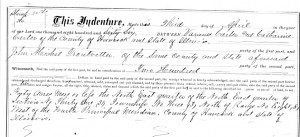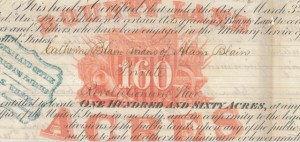Due to numerous requests, we are offering a new section of this course. The structure will be a little bit different, but the content will all be the same and there will be time for virtual interaction in real time.
Land records can contain significant genealogical clues. These records can also be confusing for researcher who is unfamiliar with their structure, purpose, terminology, and organization. Starting on 2 November, we’ll be starting a second series of my “United States Land Records” course due to popular demand. I’ve used land records extensively in my thirty-some years of family history research and have used them to solve a variety of genealogical research problems. Join us and discover more about this wonderful set of records.
Attendees will download the actual lecture to view at their leisure several days before the discussion session to follow. This allows attendees to view the presentation without connectivity issues and they can stop and pause the presentation as they need to. Discussion sessions will be the time to ask questions “live.” Registration is limited to the first twenty-five students who register.
- Week 1–discussion of different types of deeds, terms and definitions, record keeping practices and procedures, types of land ownership, and women’s property ownership changes over time.
- Week 2–discussion of metes and bounds legal descriptions, property descriptions in metes and bounds states, pre-Federal land records, and general research strategies in those states.
- Week 3–discussion of legal descriptions in federal land states, property descriptions in federal land states, and an overview of federal land records (bounty lands, cash land sales, homestead claims, etc.).
- Week 4–online demonstration of actual land record searches using indexes and records selected from online materials at FamilySearch.
- Week 5–online demonstration of search techniques and approaches to the federal land patents hosted at the Bureau of Land Management website.
Homework:
Homework is optional–there’s no grade. Students are encouraged to participate in the homework. Documents will be posted to our online private forum for students to read and discuss. Homework will consist of posting a brief analysis of a specific record or problem. Students can substitute a document of their own choosing–as long as it is the type of record actually being discussed that week.
- Week 1–two local land records
- Week 2–two metes and bounds deeds
- Week 3–research problem in a federal land state
- Week 4–a “can you find” it problem where records needed are available free online at FamilySearch.
- Week 5–no “homework,” but problems will be posted to our discussion forum a week before the lecture.
Schedule–discussions (attendance is not required as they will be recorded and available for download):
- 2 November 8:30 pm. central time–discussion 1
- 9 November 8:30 pm. central time–discussion 2
- 16 November 8:30 pm. central time–discussion 3
- 23 November 8:30 pm. central time–discussion 4
- 30November 8:30 pm. central time–discussion 5
Registration is only $40. All handouts are included and there is one for each lecture. These are new presentations created just for this course. Students also get download copies of the lectures for their personal use.


2 Responses
I signed up for this course and paid for it thorough Paypal but have not received any information from you about it even though it is supposed to start today. I will need to download the lectures and discussions because of my slow internet so will need information on how that works.
I can’t find any other way to contact you than this comment option but this certainly doesn’t need to be published.
Thanks
Sharon- Thanks for your note. A second notice just went out. Please let me know if you didn’t get it (mjnrootdig@gmail.com). Thanks. Michael